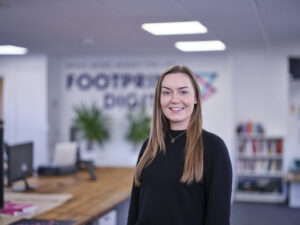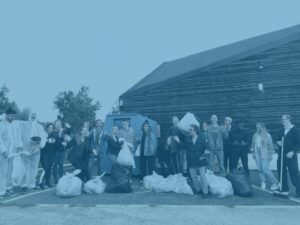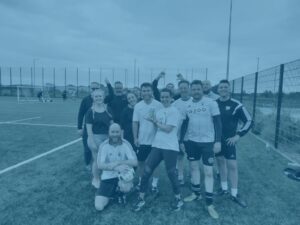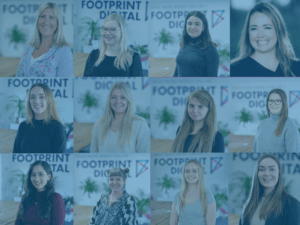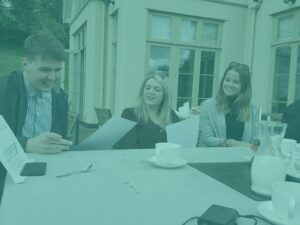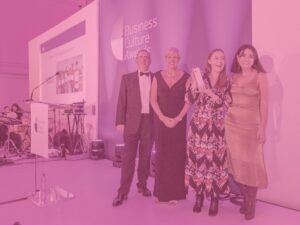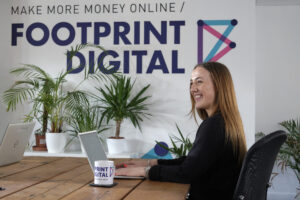
To get a better understanding of what it’s like to work with our clients day-to-day, and what our clients should expect from their dedicated Relationship Manager, we spoke with some members of our Client Services team – Sarah, Tom, and David. This is what they had to say…
Alex: Can you walk me through your experience managing digital marketing accounts?
David: It’s definitely fast-paced, and different every day depending on whether it’s a meeting heavy day, or we’re spending time on strategy, or completing monthly client reports.
Tom: It’s always a positive challenge – that’s how I see it. You’re dealing with lots of stakeholders, internally to our business and externally in our clients’ businesses, and even with the clients of our clients. It’s about keeping everyone happy and trying to make everything run as smoothly as possible.
Sarah: It’s also a really rewarding role, because we see clients who come to us and they’re suffering with their rankings, leads, sales or whatever metrics they’re focusing on and our work can transform their success. So from the team’s perspective, that’s a super rewarding thing to be able to do.
Alex: How do you stay updated with the latest trends and changes in the digital marketing landscape?
David: This partly just comes with the territory and from doing the job day to day. We’re constantly talking with people on SEO, PPC and content delivery so we have exposure to what’s going on. Then there’s the more proactive side of reading what the experts are saying – digital and tech experts tend to hang out on X (Twitter) and Reddit, so using digital as a learning tool makes sense for us. There’s a lot of people talking about a lot of amazing things in these spaces.
Tom: What people are saying on LinkedIn and keeping an eye on the big players in SEO and paid media, some we work with closely like Chris Green, others we can just learn from afar. There are lots of nuggets of gold on there. Then from a client and industry perspective it’s all about immersing ourselves into their world, talking to our clients about their business, their industry, and finding channels and places where we can really tap into what matters to them.
David: One thing that we do very well here is education. When I’ve worked at other agencies, there hasn’t been the time carved out for education and that’s the bit that’s always been lost whereas our role has been structured to ensure there is time for that.
Alex: What do you do in order to build strong and long lasting relationships with clients?
David: The biggest way that you form trust with someone is just being straight with them and being open and honest which obviously is a big part of the footprint digital way anyway. It’s only natural to sometimes want to avoid bringing attention to negative things or things that haven’t worked out and in the short term that might make the relationship seem positive, but it won’t aid it in the long term. Doing good work and having positive communication with clients is really important, but in those troubling times when it’s not all perfect, because nothing is perfect all of the time, it’s so important to maintain openness, honesty and frankness.
Sarah: Simply giving a sh*t and caring about what’s going on for our clients on a personal and professional level, hearing feedback both positive and negative and taking that on board. Honesty within the communication is vital because if we’re not on the same page, we could be going in different directions. The more in sync we are the better the relationship will be.
Alex: How do you prioritise tasks and manage multiple client accounts at the same time?
Tom: Planning using my calendar is probably my biggest tool for ensuring time is split correctly across my portfolio. Being realistic with time and gauging the length of specific tasks and making sure I’ve got those larger ones booked in well ahead of time is important. For example, if I’m putting together a six month strategy and presentation for a client, I know I can’t put that at the end of my week. It’s about being realistic and ensuring all of my clients get their share of the love.
David Ward: Our CRM is an incredibly useful tool for planning our time as well. Also having the ability to be quite agile and move on the fly because we can have all the planning in the world and then something lands and we have to pivot our attention. I think a certain amount of planning alongside being able to be agile and react to things as they occur.
Alex: Can you provide an example of a successful campaign you’ve managed in the past? What made it so successful?
Tom: Bennett’s Motorcycle Insurance I think has done fantastically over this past year and continues to grow. I think what’s made it so successful is the engagement from the clients but also using the data correctly and seeking out new opportunities for growth. They’re a client who is really engaged and involved, which is what we love, and they are also really receptive from an educational perspective.
David: One of my most successful clients is a pharmaceuticals business where we have relationships across different levels of the business. My day-to-day contact is in marketing but I also have a good relationship with his boss, and we have relationships with the different business unit owners as well. This is a client that’s testament to if you deliver consistent good work and build relationships then they start to see us as part of their team rather than an external agency.
Sarah: Where we’ve seen successes is when communication is at its best and when we’ve incorporated education. If clients are new to SEO or paid and are not 100% sure about the ins and outs then we’re really happy to do educational sessions with them, answer all of their questions and help to demystify digital for them and make them more confident in it. When the client has a better understanding that helps us all work much better and closer together and gets better results.
Alex: How do you handle client feedback and requests for changes to campaigns?
David: This is quite an interesting aspect of our role because we’re working with the clients but also with internal stakeholders. We manage both sides of the picture and if we get feedback from clients then we have to manage the communication of that to our delivery teams and ensure that we get the right work out of them. I always think quite an interesting thing about our relationships is managing that balance, but I would say again, it’s just about being open. We’re all on the same team and all have the same goals for our clients in mind.
Tom: Depending on the volume and scope of the feedback, I’ll always try to make it conversational. I like to jump on a quick call or sit in a meeting room and chat through it step by step to make the feedback visual and ensure we’re aligned on what to do next – that way I know nothing’s been lost in translation and everyone’s happy.
Sarah: We try to monitor clients’ thoughts and feelings and our processes give us the time and structure to discuss the sentiment – positive or negative – coming from our clients so we can keep everything on track. If there’s anything bigger that we need to discuss, we’ll organise a round table call with all key internal stakeholders to discuss any adjustments that need to be made. The key thing with feedback is that we always try to do something constructive with it, not just hear it and move on.
Alex: How do you measure the success of digital marketing campaigns? What key performance indicators do you focus on most often for our clients?
David: All clients are very different, obviously there’ll be similar themes running through for example if it’s a PPC campaign, we want to be driving as much traffic as we can in a cost effective way that delivers a good return on ad spend, but that’s an obvious one that we’d want to achieve for anybody. It’s more about digging into the individual clients’ business goals and their industry niches and specifics that resonate most with them.
Alex: How do you collaborate with other teams (e.g., SEO, Content and PPC) to ensure the success of campaigns?
David: Internal alignment meetings are key for this. For example, I’m now working with Sam (SEO) and Becky (Content) on three quite big accounts so we now have a mega alignment meeting at the start of every month to discuss strategy and actions for those clients, and then a shorter alignment meeting towards the end of the month. That ensures we’re all on the same page, that delivery is happy with how the accounts are progressing, and means I can communicate effectively back to the clients without anything getting lost or miscommunicated.
We also have our Relationship Manager catch up meeting once a week. Our Head of Search, Chris, also joins that. Having the head of another department join that call means that we can discuss any challenges or opportunities with him directly and be really proactive with that. It stops our departments being siloed and means we’re all working really closely together to make the most out of each client account.
Tom: Each employee also fills out a ‘manual of me’ when they join the company, which helps all of us understand how everyone likes to communicate internally. That’s been super helpful for me to know the best way to ask the delivery teams for things and to give them feedback, and ensure my communication is as effective as possible.
Alex: How do you collaborate with partners to ensure the success of campaigns and add value for our clients?
Sarah: Regular contact – communication is the word of the day! We only work with trusted Partners as well, and to build a better relationship with those Partners we invest a lot of our time in educational pieces where partners teach us about their work and we teach them about ours. All of the work we do with our partners is about making sure that we work as a combined force, not separate entities. We have a common goal of supporting our clients to be the best they can be.
We also have chemistry sessions with the partners that we put in front of our clients. Our ultimate goal is to make sure that our clients are happy so we have to make sure that the partners are the right fit. We don’t just provide one potential partner if a client asks us to find an agency who does something that we can’t do, like design or development, or PR. We make sure that we give them access to two or three partners and support them in that chemistry session to make the right choice for them.
Alex: What do you think sets apart effective digital marketing account managers from ineffective ones?
Tom: Speaking up, leading and guiding clients, steering them in the right direction and providing the support that they actually need, which is different for each client. Good account managers also immerse themselves within the platforms they use, so things like Google Analytics and the Google ads platform which we all have to pass exams in each year at this agency to prove our knowledge is up to date.
Sarah: Being proactive and being aware of the client’s industry. We do SEO and PPC and Content, but each of those things can be applied differently for each industry depending on differing customer journeys, KPIs, industry standards and terminology. We need to be the expert person that they can rely on.
